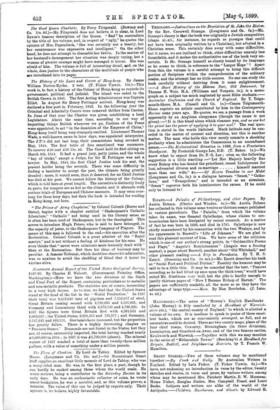MEOLOGY.-1 - 114IlletiOnS On the Revelation of St. John the Prim- By
the Rev. Cresswell Strange. (Longmaus and Co. 6s.)—Mr. Strange's theory is that the book was originally a Jewish composition (chaps. xi.-xii., for instance, he regards as passages that could not have been originally written by a Christian), but adapted in a Christian sense. This certainly does away with some difficulties, but it raises, we are inclined to think, other difficulties scarcely less formidable, and it makes the authoritative use of the book very un- certain. Is Mr. Strange himself as closely bound by its language as he seems to think, in reference to the "Larger Hope"? Apart from this, the volume is a careful attempt to bring this difficult portion of Scripture within the comprehension of the ordinary reader, and the attempt has no little success. No one can study the book carefully without deriving from it some enlightenment. —A Short History of the Hebrew Teat, Old Testament,. by Thomas H. Weir, MA. (Williams and Norgate, 5s.), is a mono- graph on a subject too much neglected by most Bible students.— Auricular Confession and the Church of England. By T. Teign- mouth-Shore, MA. (Cassell and Co. Is.)—Canon Teignmouth- Shore reprints an article contributed by him to the Contemporary Renew some years ago. He quotes, we see, a passage from a work apparently by an Anglican clergyman (though the name is not given) :—" It is this blood alone which cleanses you, and no one but the priest has the power of applying it to your soul." The real-ques- tion is stated in the words italicised. Much latitude may be con- ceded in the matter of counsel and direction, but this is another matter. The man who holds this view surely commits a shocking profanity when he administers the Communion to an unconfessed person.—The Ecclesiastical Situation in 1899, from a Tractarian Standpoint. By Frederick George Lee, D.D. (T. Baker, le.)—We know what to expect from Dr. F. G. Lee ; even so, the following suggestion is a little startling :—" Let Her Majesty heavily fine every Bishop who has denied the priesthood, issued Indulgences for lust, advocated divorce and re-marriage himself married more than one wife," &c.—Of Direr* Troubles in our Midst (Longmans and Co., Is.) is a dialogue between " Senex," " Catho- liens," and " Evangelicus," and is intended as an eirenionn. "Senex " reproves both his interlocutors for excess. If he could only be listened tol






































 Previous page
Previous page